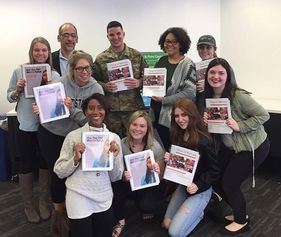 By Natalie Meek The Bateman teams were hard at work the past six months and finalized their campaigns April 5 to turn in their casebooks. Both teams feel confident in their final products, and are proud of the work that they produced for the community. The Bateman Gold team consists of Latisha Ellison, Daniel Henderson, Lauryn Rosinski and Taylor Pierce. Their campaign was for The Campaign to Change Direction, focusing on the mental heath of senior citizens. Bateman Blue consisted of Nicole Zahn, Holly Disch, Brittany Prather, Kristin Slomiany and Charleah Trombitas. This team's campaign was "Are You Ok? #ItIsOkToAsk," which encouraged people to recognize and talk about mental illness. Latisha Ellison stated that she and her Bateman Gold team view their project as a success. "We reached our objectives and felt like we truly made an impact in the senior center community," Ellison says. "We had several seniors tell us they would share this information with their families." After learning about the importance of research in class for so many years, the team members had the chance to experience research significance in a real life campaign. Each team's campaign was based off of the research they conducted. All of this work showed Ellison and her team members that creating a campaign takes a lot of thought and consideration. "Every detail needs thought out and you always need to remember your objectives and goals," Ellison says. Holly Disch of Bateman Blue also agreed that her team's project turned out well. She believes that all of the work they put in the past six months was worth the dedication, and is looking forward to finding out what the judges think of their work. Just as it is in the real world, Disch believes teamwork was an important aspect of this project. "The experience taught me the importance of teamwork, and being there for your friends rather than them just being a part of the school project," Disch says. "There were so many aspects of the real world I got from Bateman, and I will take the lessons of work ethic and time management with me in my future." Although both teams are optimistic about their final products, they both overcame challenges along the way. Disch and team members turned these obstacles into motivation and found it was an important part of the journey. "There were times I thought the book wasn't going to get done, or we were not going to reach our objectives," Disch says. " I think when those feelings hit, it is stressful, but it made me think about what we need to do instead of 'why is this happening.'" Ellison also explained some difficulties that Batman Gold faced, many of which included issues with their target audience. They were targeting the audience of caregivers, however, they realized that not all qualified people identified themselves as such. "For most people, they are caring for a parent, grandparent or spouse, so they were just doing the right thing and didn't compare themselves to paid caregivers," Ellison says. "This was a tough realization for our team because it meant that we had to change our audiences, objectives, tactics, and figure out how to reach an audience who didn't identify themselves." Overall, both teams are excited to receive feedback from the judges and have gained valuable experience by being a part of the Bateman competition. If you are interested in finding more out about the Bateman Case Study Competition, contact Tim Roberts at [email protected].
0 Comments
Leave a Reply. |
Archives
February 2024
Categories
All
|
 RSS Feed
RSS Feed
